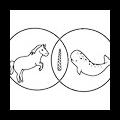rainworm reviewed Yellowface by R.F. Kuang
refreshing and fun
4 stars
I like the premise, the plot, the narrator and the discussion about cultural appropriation. The writing flows nicely. The pop culture references and the tweets were fun at the start too, but eventually it got too repetitive for my taste. I get that the main character was spiraling, but it felt tedious towards the end. At times, the villain-ness of the main character felt too heavy-handed, verging on rage-bait (or was it just too close to home?). And the ending didn't do the book justice.
I like the premise, the plot, the narrator and the discussion about cultural appropriation. The writing flows nicely. The pop culture references and the tweets were fun at the start too, but eventually it got too repetitive for my taste. I get that the main character was spiraling, but it felt tedious towards the end. At times, the villain-ness of the main character felt too heavy-handed, verging on rage-bait (or was it just too close to home?). And the ending didn't do the book justice.








